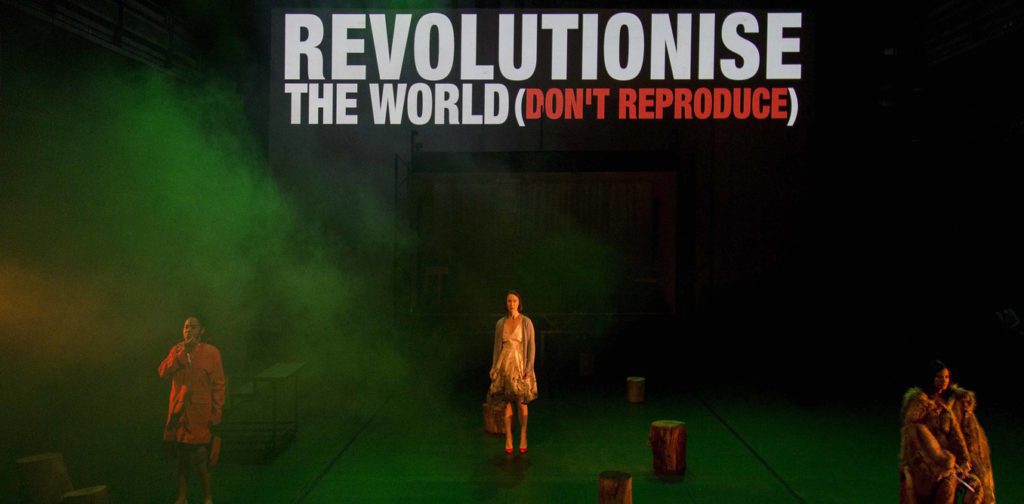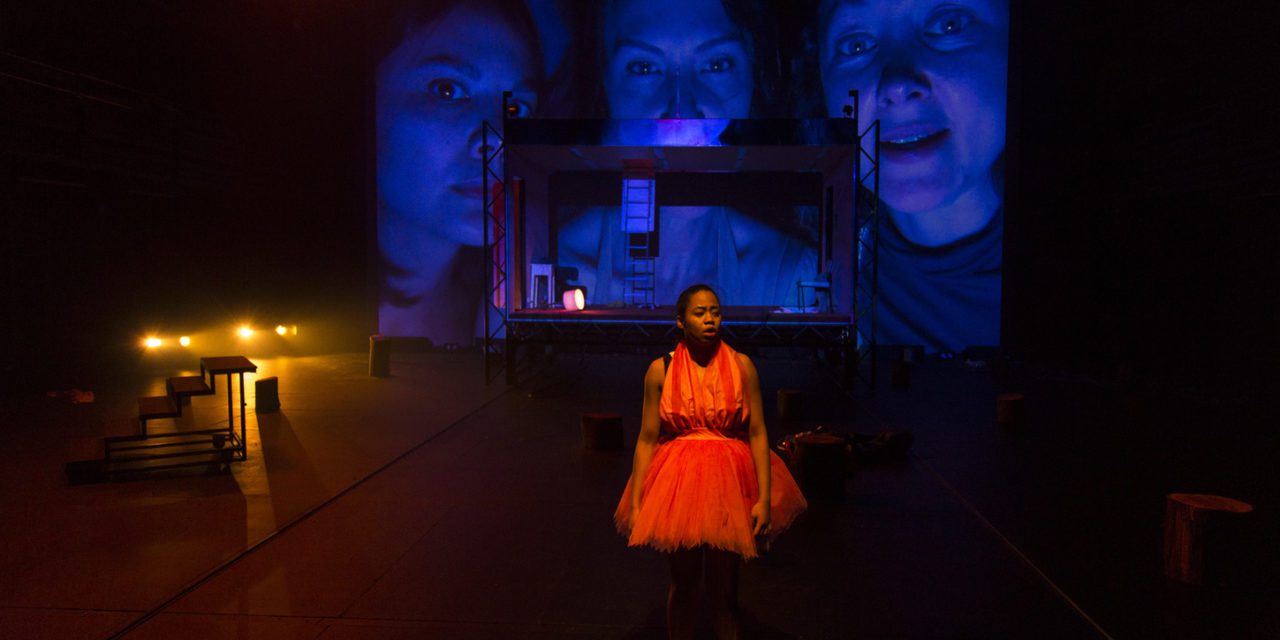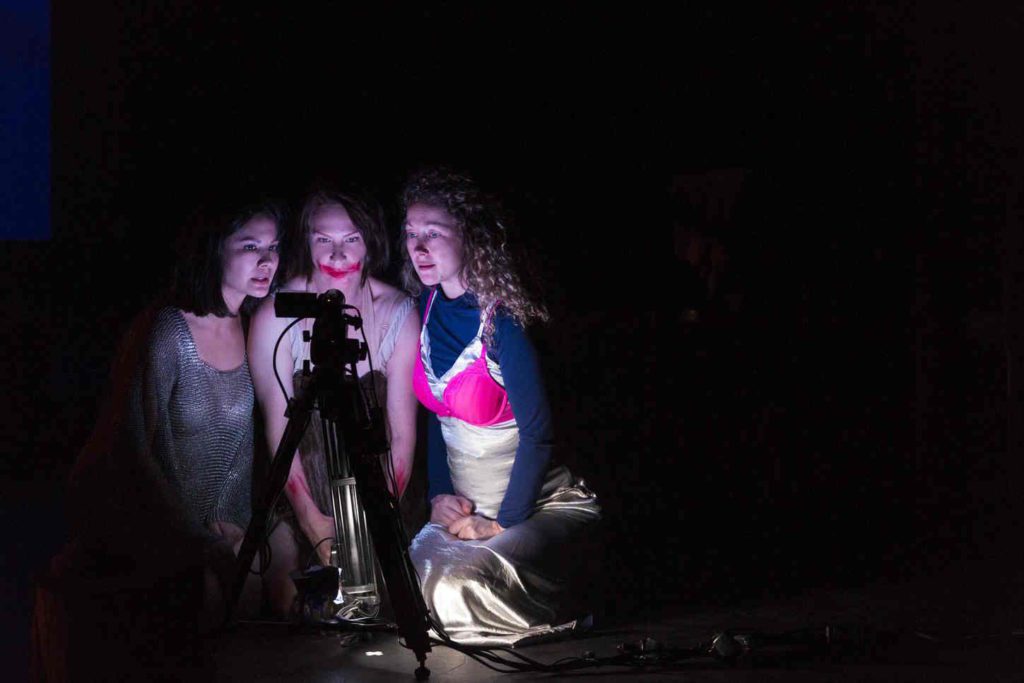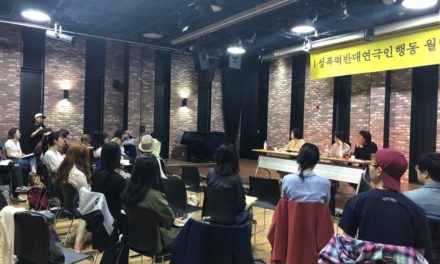Alice Birch’s production, Revolt. She said. Revolt again., currently on at Melbourne’s Malthouse Theatre, has been staged before as part of the 2014 Midsummer Mischief festival at Royal Court in London. The play was a response to a famous feminist provocation, “well behaved women seldom make history”. The provocation belongs to the historian, Laurel Thatcher Ulrich, who also adjudicated the plays to be included in London’s radical season.
It comes as no surprise that Birch’s feminist theatre caught Ulrich’s eye. As Professor at the Department of History at Harvard University, Ulrich’s writing unearths the lost voices of ordinary people, women in particular. In Revolt, women’s creative work, from the direction to the stage design, is center stage.
The play begins with us staring into solid blackness, framed by a neon rectangle. This genius lighting design by Emma Valente gives the impression of staring into an abyss. Or is it a void? Slowly, the silhouette of a woman appears. She is striking a sexy pose.
As the lights come up to full, we see that the void is a room, a drab hotel, furnished with a beige bureau and two chairs. From here a series of four vignettes ensues in which different women jostle for bargaining power. One would like to center her own pleasure during sex, another is desperate to avoid an unwanted marriage proposal, yet another simply wants Mondays off work.
The play is loosely divided into three parts, with a five-person cast performing multiple roles. Almost all are women, Elizabeth Esguerra, Ming-Zhu Hii, Belinda McClory, and Sophie Ross with the exception of actor Gareth Reeves, who by default plays the “male” roles. Only rarely are the characters in the play assigned proper names.
The opening section is funny; one woman likens a marriage proposal to being asked to participate in a terror attack, another diverts her boyfriend’s sex talk so that she might insert her own “organ”, as an active participant in their narratives about sex. These scenes are performed in the style of a comedy of errors. They present a comedic romp through misfiring conversations, but nothing of the political edginess promised in the promotion of the play.
Then the mood shifts; the play becomes darker, more surreal. The comedic opening had lured me into a false sense of security. In the next scene a woman has supposedly taken off her clothes in a supermarket in a gesture of excess. Two managers berate her using management speak combined with expletives. Trapped in this ritual of humiliation she sits with her back to us, faceless, and speechless. As she endures their jeers, the woman gets up. She unlocks a trapdoor in the ceiling and climbs to the roof. Is it a protest, a suicide, or is it a surrender? It is a surrender, of the most hopeless kind.
The supermarket woman, played by actor Sophie Ross, tells of all the restrictions, prescriptions and unwanted interventions imposed onto her body by advertising, men, work, and life. Much hinges on the delivery of this scene, which is no longer in the style of an easy comedy of errors but deadly serious. It is both tender and cutting, a testament to her skill as an actor. Her pitch becomes fevered as she describes her complete surrender to the most violent of incursions; rape. With arms outstretched, she declares that she can’t possibly be raped if she “wants it.”
The woman’s radical surrender to the violence of misogyny is the play’s key gesture; it is the dizzying abyss that Birch has us staring at. Reminiscent of playwright Sarah Kane’s writing style, Birch seems to be saying that this was a revolution that took too long, and if not already lost, it has been seriously derailed.
The middle section of the play takes place outside of the frame, giving the impression of open space. Three figures occupy the set; who the three figures are is unclear. One sits on a log, wearing a fur that is reminiscent of an Indigenous elder’s ceremonial robe. Another wears a cocktail dress. The third figure, Agnes, is wearing a raincoat. She is the only one with a proper name. There seems to be hidden symbolism in this section making the relationship between them difficult to discern. The dialogue implies that the woman wearing the robe is the grandmother of Agnes.
The woman in the cocktail dress, played by Belinda McClory, attempts to reconcile the woman and the granddaughter. She is masterful in the role, delivering a series of vocal outbursts and repressions. She draws us deep into an uncomfortable revelation, which includes explicit details of being raped by her father. It’s too dark, I feel tears beginning to well up as McClory delivers these blows. The language is more poetic than realist, which leads me to the question: is this a metaphor about stolen lands, people, and sovereignty? A horror beyond reconciliation?
The feminist philosopher and theatre maker, Hélène Cixous famously said, “Write Yourself. Your body must be heard,” and, “Women should break out of the snare of silence.”
Even if only figuratively, inventive language offers a space of possibilities. It can offer refuge or it can imprison. Birch seems to be exploring the latter. In the final section of the play, the actors perform a series of furious costume changes, while chanting slogans. Belinda McClory stalks the stage, wearing a pair of bloodied underpants around her ankles and chanting, “I have choices, I have choices, I have choices.” Her delivery makes it sound like an empty platitude, or the mindless babble of social media speak. It is altogether apocalyptic.
Revolutionary words in a male-dominated world do not resound. They fall on the dead ground. The play concludes with actor Elizabeth Esguerra uttering, “who knew the world could be so awful.”

Elizabeth Esguerra, Belinda McClory and Ming Zhu Hii in Revolt. She Said. Revolt Again at Melbourne’s Malthouse. Photo: Pia Johnson
Revolt. She said. Revolt again. will be on at the Malthouse Theatre, Melbourne, until July 9.
This article was reposted with permission from The Conversation. To read the original article, click here.
This post was written by the author in their personal capacity.The opinions expressed in this article are the author’s own and do not reflect the view of The Theatre Times, their staff or collaborators.
This post was written by Sandra D'urso.
The views expressed here belong to the author and do not necessarily reflect our views and opinions.



















